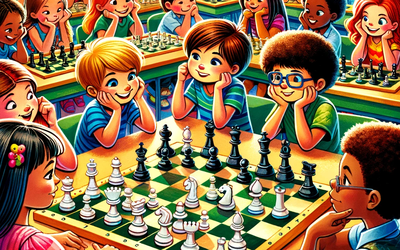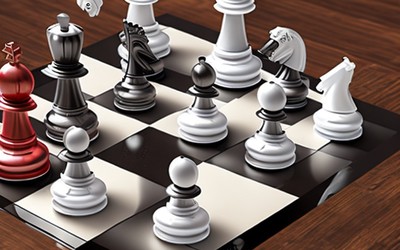
https://www.piqsels.com/en/search?q=chess
Chess Is Still Hard!
Mistakes in Playing ChessAt times, I'll win a game of chess and bask in the glory of victory. To delve deeper into the game, I'll request a computer-analyzed report to see the game's results. I feel proud when I realize that I've won the game without making any blunders. However, this morning, I was taken aback by the number of "mistakes" indicated in the report. It made me realize that I hadn't been paying enough attention to the number of mistakes and their significance. It was a humbling moment, and I decided to learn more about what constitutes a "mistake" in chess. Even if we play without any blunders, the number of mistakes can be daunting. Let us dive into it.
Understanding Mistakes and Blunders in Chess
Introduction
In the game of chess, mistakes and blunders can cost a player the game. While blunders are often easy to identify, mistakes can be less obvious and therefore more difficult to eliminate. In this article, we will define what a mistake is in chess, explore the difference between a mistake and a blunder, and look at research that can help players make fewer mistakes. Additionally, we will provide a solution to analyze your games using the Lichess.org game analyzer tool.
What is a Mistake in Chess?
A mistake in chess is a move that is not optimal but does not immediately lose the game. Unlike a blunder, a mistake may not result in a significant material loss or a checkmate threat. However, over time, accumulating mistakes can lead to a disadvantageous position and potentially a loss. Mistakes can be caused by a variety of factors, such as overlooking a tactical possibility or miscalculating a line.
Difference Between Mistakes and Blunders
A blunder in chess is a move that is outright bad and leads to a significant disadvantage or loss. Blunders can be caused by overlooking a simple tactic or miscalculating a line. The difference between a mistake and a blunder is the severity of the consequence. While a blunder can cost a player the game immediately, a mistake is a less severe error that may not have an immediate consequence but can accumulate over time.
Eliminating Mistakes in Chess
Eliminating mistakes in chess requires a combination of knowledge, practice, and discipline. Some strategies that can help reduce mistakes include:
- Analyze your games: After each game, analyze your moves and look for areas where you made mistakes. This will help you identify patterns in your play and areas where you need to improve.
- Study chess tactics and endgames: By studying chess tactics and endgames, you can develop a better understanding of the game and improve your ability to calculate lines accurately.
- Play slower time controls: Playing slower time controls can help reduce mistakes by giving you more time to think and analyze your moves.
- Take breaks: Taking breaks during a game can help reduce mental fatigue and improve your ability to focus on the game.
Analyzing Your Games with Lichess.org Game Analyzer Tool
One way to identify and learn from your mistakes is by using the game analyzer tool on Lichess.org. This free online tool allows you to upload a game and analyze it move by move. Here's how to use it:
- Go to Lichess.org and create an account if you don't have one already.
- Click on "Play with the computer" or "Play with a friend" to start a game. Alternatively, you can upload a game that you played offline.
- Once the game is over, click on "Analysis board" in the top right corner of the screen.
- Click on "Import game" and select the game you want to analyze. The game will then appear on the analysis board.
- Click on "Stockfish analysis" to start analyzing the game move by move. The tool will show you the best move, the second-best move, and the evaluation of each move.
- Pay attention to the moves where the evaluation changes significantly. These are often the moves where mistakes or inaccuracies were made.
- After analyzing the game, take note of the areas where you made mistakes and think about how you can improve in those areas.
Research on Reducing Mistakes in Chess
There has been research on the topic of reducing mistakes in chess. One study found that players who focused on improving their calculation abilities made fewer mistakes in their games. Another study found that playing against stronger opponents can help players reduce mistakes by exposing them to more challenging and complex positions.
Additionally, researchers have studied the effectiveness of computer programs in helping players reduce mistakes. One study found that players who used a chess training program that focused on calculation and pattern recognition made fewer mistakes and improved their overall chess skills.
Conclusion
Mistakes are a common occurrence in chess, but by understanding what they are and how to eliminate them, players can improve their game and avoid costly errors. The key to reducing mistakes in chess is a combination of knowledge, practice, and discipline. By analyzing your games, studying tactics and endgames, playing slower time controls, taking breaks, and using tools such as the Lichess.org game analyzer, you can identify and learn from your mistakes and become a stronger chess player.
You can visit more of my chess contributions here:
1.https://audiochesscoach.com
2. https://chemcoolchess.co.za
3. https://learn-to-play-chess.com
More blog posts by Homebot

Unlocking Potential: A Chess Class Demo Reveals Early Signs of Talent
Explore the nuances of identifying potential chess talents in children as young as 7, based on real …
Be Nice in the Chat!
Promoting a Positive Chat Environment: A Reflection on Lichess Platform Broadcasting
d4 d5 c6 a6 takes takes Be2 g7 takes then b1......What?
The Challenge of Conveying Chess: Bridging the Gap Between Grand Masters and Novice, Family and Kids…
